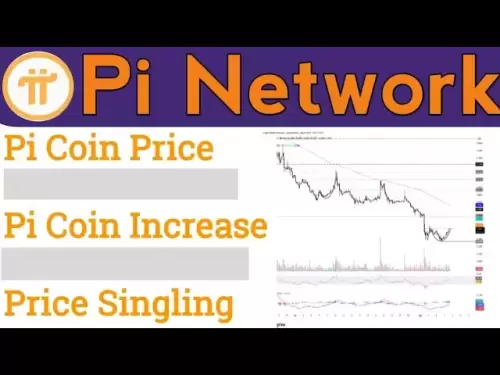-
 Bitcoin
Bitcoin $118300
1.01% -
 Ethereum
Ethereum $4215
0.69% -
 XRP
XRP $3.198
-3.83% -
 Tether USDt
Tether USDt $1.000
-0.01% -
 BNB
BNB $803.4
-0.53% -
 Solana
Solana $180.3
-0.67% -
 USDC
USDC $0.9998
-0.01% -
 Dogecoin
Dogecoin $0.2334
-1.49% -
 TRON
TRON $0.3394
0.86% -
 Cardano
Cardano $0.7980
-1.45% -
 Chainlink
Chainlink $22.19
6.65% -
 Hyperliquid
Hyperliquid $43.41
0.13% -
 Stellar
Stellar $0.4407
-3.13% -
 Sui
Sui $3.843
-2.24% -
 Bitcoin Cash
Bitcoin Cash $564.7
-3.74% -
 Hedera
Hedera $0.2588
-3.41% -
 Ethena USDe
Ethena USDe $1.001
0.00% -
 Avalanche
Avalanche $23.64
-3.37% -
 Litecoin
Litecoin $120.0
-4.01% -
 Toncoin
Toncoin $3.342
-1.11% -
 UNUS SED LEO
UNUS SED LEO $9.038
0.60% -
 Shiba Inu
Shiba Inu $0.00001347
-0.81% -
 Uniswap
Uniswap $10.69
-4.58% -
 Polkadot
Polkadot $4.034
-1.30% -
 Dai
Dai $1.000
0.01% -
 Bitget Token
Bitget Token $4.472
-1.52% -
 Cronos
Cronos $0.1571
-3.04% -
 Pepe
Pepe $0.00001207
-2.21% -
 Monero
Monero $273.8
-3.19% -
 Ethena
Ethena $0.7520
2.75%
What are the main differences between perpetual contracts and traditional futures contracts?
Perpetual contracts offer perpetual trading with a cash settlement mechanism, while traditional futures contracts have predetermined expirations and physical settlements based on underlying asset prices.
Feb 26, 2025 at 10:13 am
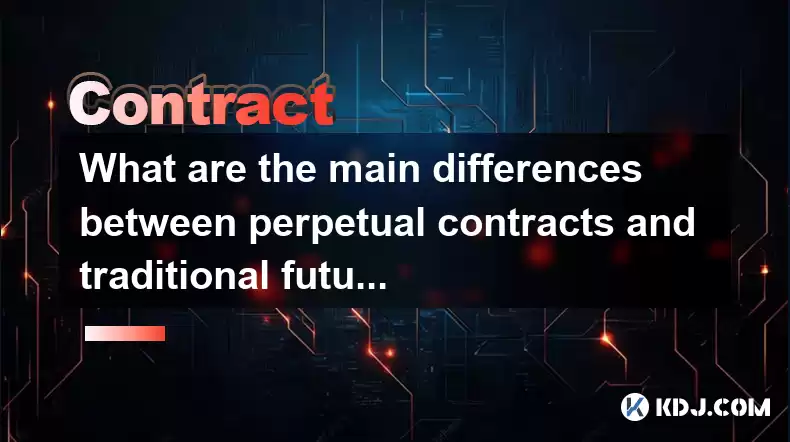
Key Differences between Perpetual Contracts and Traditional Futures Contracts
Contract Duration:
- Perpetual contracts do not have a fixed expiration date and can be held indefinitely, while traditional futures contracts have a predetermined expiration date.
Pricing Mechanism:
- Perpetual contracts are typically priced using a funding rate mechanism, which adjusts the contract price to match the spot market price. Traditional futures contracts are priced based on the underlying asset's future expected price.
Settlement:
- Perpetual contracts are settled in cash, with the difference between the contract price and the settlement price being paid out. Traditional futures contracts are settled physically, meaning the underlying asset is delivered to the buyer.
Detailed Explanation of Key Differences
1. Contract Duration
- Perpetual Contracts: Designed for traders who want to maintain long or short positions without the need to worry about contract expiration. This flexibility allows traders to adjust their positions based on market conditions without incurring additional costs or fees.
- Traditional Futures Contracts: Have a specified expiration date, typically quarterly or monthly. Traders must close their positions before the contract expires or risk losing their investment if the contract moves against them.
2. Pricing Mechanism
- Perpetual Contracts: Use a funding rate mechanism to align the contract price with the spot market price. The funding rate is a small fee paid either to long or short positions to incentivize convergence with the spot market. If the contract price is above the spot market price, long positions pay a funding fee to short positions. Conversely, if the contract price is below the spot market price, short positions pay a funding fee to long positions.
- Traditional Futures Contracts: Priced based on the underlying asset's future expected price, which is determined by supply and demand. Futures prices typically reflect market sentiment and expectations about the future direction of the asset's price.
3. Settlement
- Perpetual Contracts: Settled in cash, eliminating the need for physical delivery of the underlying asset. The profit or loss from a perpetual contract is realized by the difference between the opening and closing prices and is paid in the form of cryptocurrency.
- Traditional Futures Contracts: Settled physically, meaning the buyer receives the underlying asset at the contract's expiration date. This process involves the delivery of the asset, such as a physical commodity or financial instrument, and can result in additional costs and complexities.
FAQs
1. Which type of contract is more suitable for short-term trading?
Perpetual contracts are generally more suited for short-term trading due to their lack of expiration date and flexibility in position adjustment.
2. Which type of contract involves lower fees?
Perpetual contracts typically have lower fees compared to traditional futures contracts, especially for holding positions over longer periods.
3. Can perpetual contracts be used for hedging?
Perpetual contracts can also be used for hedging strategies, but it's important to consider the funding rate mechanism and the potential impact on hedging effectiveness.
4. What is the maximum leverage available for perpetual contracts?
The maximum leverage available for perpetual contracts varies depending on the exchange and the underlying asset. It is typically higher than the leverage offered for traditional futures contracts.
5. Can I trade perpetual contracts on multiple exchanges?
Yes, perpetual contracts can be traded on multiple crypto exchanges that offer them. It's recommended to research and compare different exchanges to find the one with the most favorable terms for your trading needs.
Disclaimer:info@kdj.com
The information provided is not trading advice. kdj.com does not assume any responsibility for any investments made based on the information provided in this article. Cryptocurrencies are highly volatile and it is highly recommended that you invest with caution after thorough research!
If you believe that the content used on this website infringes your copyright, please contact us immediately (info@kdj.com) and we will delete it promptly.
- Dogwifhat's Comeback: Solana Meme Coin Mania and Beyond!
- 2025-08-10 18:30:15
- Shiba Inu Price Drop Alert: Can Google AI Predict the Future?
- 2025-08-10 18:30:15
- NEAR Protocol Rebound: Eyes on $4.63 as Bullish Momentum Builds
- 2025-08-10 17:30:13
- Bitcoin Cash Halving: Will the Price Fall or Fly?
- 2025-08-10 17:30:13
- Uniswap (UNI) Under Bearish Pressure: A Technical Analysis Deep Dive
- 2025-08-10 17:30:15
- DOT Price on the Rise: Polkadot's Bullish Momentum Heats Up!
- 2025-08-10 17:30:15
Related knowledge
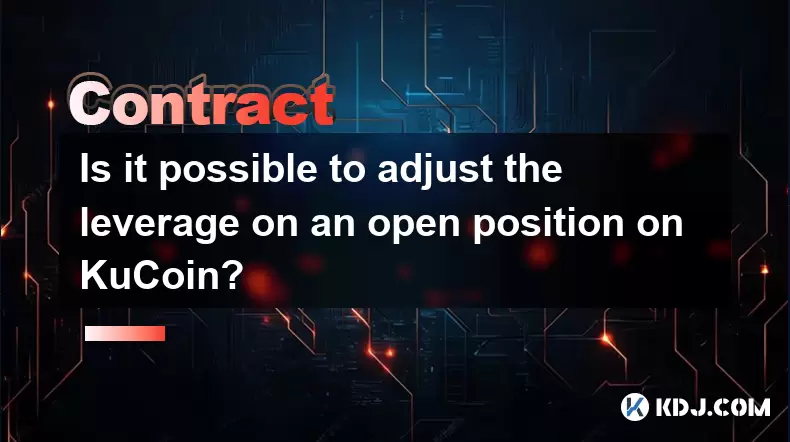
Is it possible to adjust the leverage on an open position on KuCoin?
Aug 09,2025 at 08:21pm
Understanding Leverage in KuCoin Futures TradingLeverage in KuCoin Futures allows traders to amplify their exposure to price movements by borrowing fu...
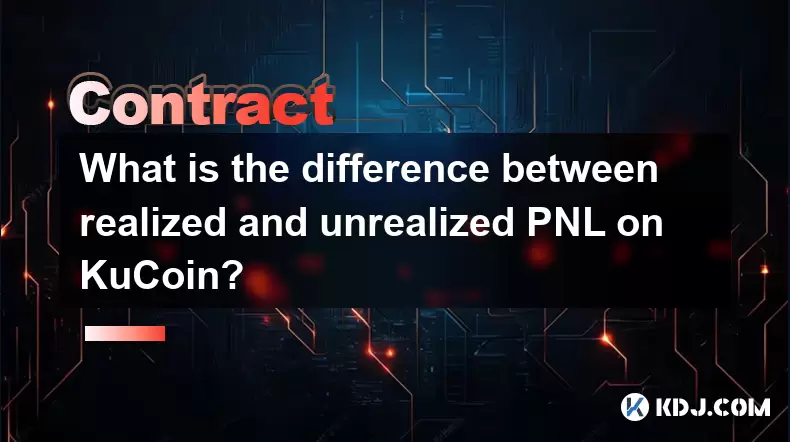
What is the difference between realized and unrealized PNL on KuCoin?
Aug 09,2025 at 01:49am
Understanding Realized and Unrealized PNL on KuCoinWhen trading on KuCoin, especially in futures and perpetual contracts, understanding the distinctio...
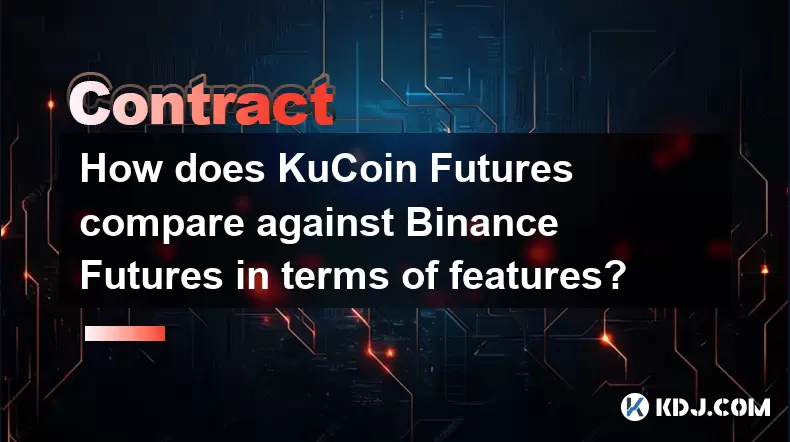
How does KuCoin Futures compare against Binance Futures in terms of features?
Aug 09,2025 at 03:22am
Trading Interface and User ExperienceThe trading interface is a critical component when comparing KuCoin Futures and Binance Futures, as it directly i...
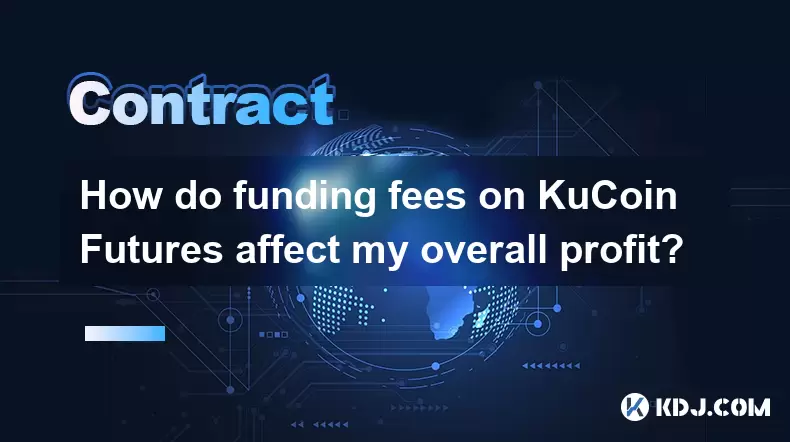
How do funding fees on KuCoin Futures affect my overall profit?
Aug 09,2025 at 08:22am
Understanding Funding Fees on KuCoin FuturesFunding fees on KuCoin Futures are periodic payments exchanged between long and short position holders to ...
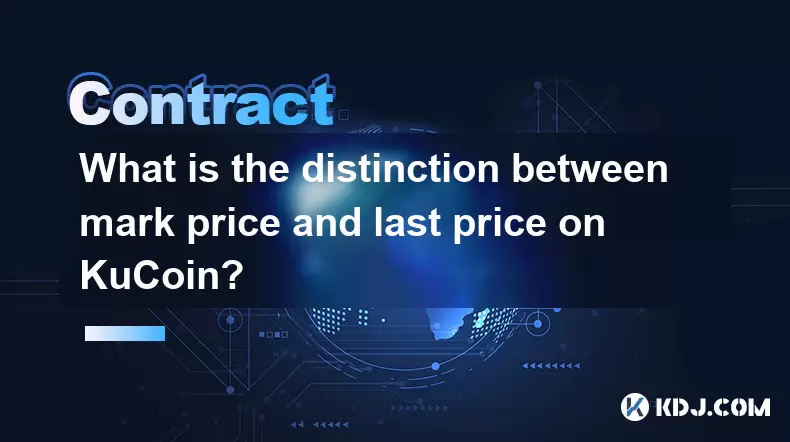
What is the distinction between mark price and last price on KuCoin?
Aug 08,2025 at 01:58pm
Understanding the Basics of Price in Cryptocurrency TradingIn cryptocurrency exchanges like KuCoin, two key price indicators frequently appear on trad...
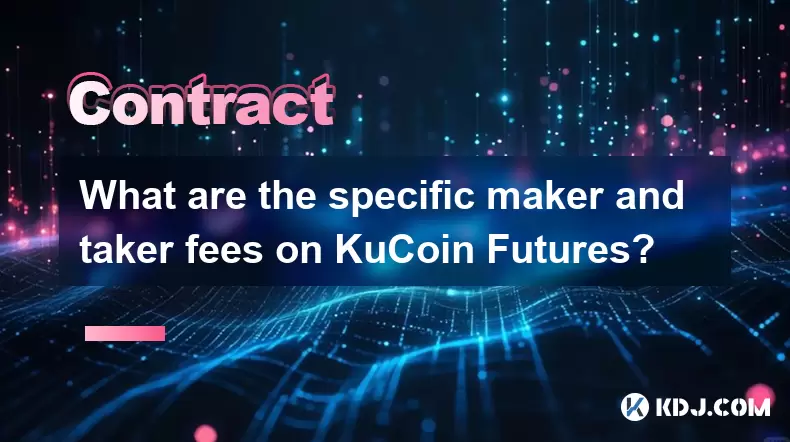
What are the specific maker and taker fees on KuCoin Futures?
Aug 08,2025 at 08:28am
Understanding Maker and Taker Fees on KuCoin FuturesWhen trading on KuCoin Futures, users encounter two primary types of fees: maker fees and taker fe...

Is it possible to adjust the leverage on an open position on KuCoin?
Aug 09,2025 at 08:21pm
Understanding Leverage in KuCoin Futures TradingLeverage in KuCoin Futures allows traders to amplify their exposure to price movements by borrowing fu...

What is the difference between realized and unrealized PNL on KuCoin?
Aug 09,2025 at 01:49am
Understanding Realized and Unrealized PNL on KuCoinWhen trading on KuCoin, especially in futures and perpetual contracts, understanding the distinctio...

How does KuCoin Futures compare against Binance Futures in terms of features?
Aug 09,2025 at 03:22am
Trading Interface and User ExperienceThe trading interface is a critical component when comparing KuCoin Futures and Binance Futures, as it directly i...

How do funding fees on KuCoin Futures affect my overall profit?
Aug 09,2025 at 08:22am
Understanding Funding Fees on KuCoin FuturesFunding fees on KuCoin Futures are periodic payments exchanged between long and short position holders to ...

What is the distinction between mark price and last price on KuCoin?
Aug 08,2025 at 01:58pm
Understanding the Basics of Price in Cryptocurrency TradingIn cryptocurrency exchanges like KuCoin, two key price indicators frequently appear on trad...

What are the specific maker and taker fees on KuCoin Futures?
Aug 08,2025 at 08:28am
Understanding Maker and Taker Fees on KuCoin FuturesWhen trading on KuCoin Futures, users encounter two primary types of fees: maker fees and taker fe...
See all articles

























